

Wetenschapsagenda: verbeelding, krachtenbundeling en kruisbestuiving. UvA staff for a new university. Naar een andere Universiteit. Longread: Open Access in de geesteswetenschappen. In november 2013 maakte staatssecretaris Dekker (OCW) zijn beleid voor het publiceren in Open Access bekend in een brief aan de Tweede Kamer.
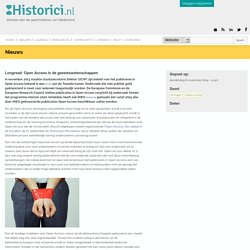
Onderzoek dat met publiek geld gefinancierd is moet voor iedereen toegankelijk worden. De Europese Commissie en de European Research Council stellen publicaties in Open Access verplicht bij onderzoek binnen het programma Horizon 2020. Inmiddels heeft ook NWO bekend gemaakt dat vanaf 2015 alle door NWO gefinancierde publicaties Open Access beschikbaar zullen worden.
Nu de Open Access beweging ook politieke steun krijgt en er zelfs gesproken wordt over een revolutie, is de discussie erover uiterst actueel geworden, eens te meer als deze geplaatst wordt in het kader van de bredere discussie over het belang van valorisatie, transparantie en integriteit in de wetenschap en de sharing economy. Enigszins verbazingwekkend dus dat bij de twee debatten over Open Access die de Universiteit Utrecht afgelopen weken organiseerde (‘Open Access. ‘Gold’ en ‘Green’ Forum: The Status Quo of Digital Humanities in Europe. In October and November 2014, H-Soz-Kult publishes a series of essays on "The Status Quo of Digital Humanities in Europe".
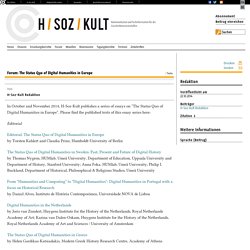
Please find the published texts of this essay series here: Editorial Editorial: The Status Quo of Digital Humanities in Europeby Torsten Kahlert and Claudia Prinz, Humboldt-University of Berlin The Status Quo of Digital Humanities in Sweden: Past, Present and Future of Digital Historyby Thomas Nygren, HUMlab, Umeå University, Department of Education, Uppsala University and Department of History, Stanford University; Anna Foka, HUMlab, Umeå University; Philip I.
Buckland, Department of Historical, Philosophical & Religious Studies, Umeå University. Home - Podium voor onderzoekers. Science in Transition doet mee. CLARIN-NL. The History Manifesto. De waarde van de Geesteswetenschappen. Horizon 2020 provisions for humanities criticised. Lack of interdisciplinarity and pared funds a cause of concern for social sciences Social sciences and humanities researchers have strongly criticised the provisions for their subjects in the European Commission’s next research and innovation programme, Horizon 2020.
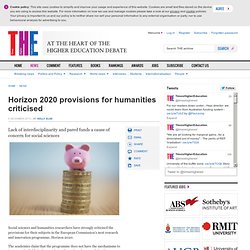
The academics claim that the programme does not have the mechanisms to integrate the fields in the way that policymakers hope, and they have concerns about the amount of funding available. Horizon 2020 is to begin next year and will replace the Seventh Framework Programme (FP7), which has run since 2007. Under the new scheme, €70 billion (£58 billion) is earmarked for research over the coming seven years. Earlier this year, Máire Geoghegan-Quinn, the European Commissioner for Research, Innovation and Science, pledged that Horizon 2020 would offer a “bold new vision” for the social sciences and humanities. Seven challenges, including climate change, energy security, green transport and public health, have been listed. Regie Geesteswetenschappen. Frits Staal over de Kleine Letteren in Nederland. Stop Defending the Humanities.
March 1, 2014 — Whatever things the humanities do well, it is beginning to look as if promoting themselves is not among them. I say this after having read widely across the rapidly accumulating literature in defense of the humanities, to which this book loosely belongs. Strictly speaking, The Humanities and Public Life is a record of a seminar on the ethics of reading organized by Peter Brooks at Yale, but whose participants (all of them well-known and formidably accomplished scholars) often found themselves moving into exactly the “defense of the humanities” mode that enabled someone—I assume the publisher—to present the book under a slightly misleading but presumably marketable title.
It turns out that the humanities’ defensive accounts of themselves have some rather curious features. Regeln für den Menschenpark. Ein Antwortschreiben zum Brief über den Humanismus - die Elmauer Rede 31.
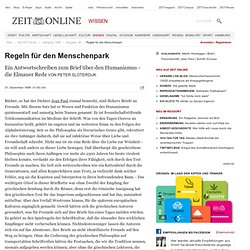
eHumanities — Royal Netherlands Academy of Arts and Sciences. Funding the humanities: what story do we want to tell? Three quarters of a century ago, Virginia Woolf posed the question: if you had just three guineas to share, what would you support?
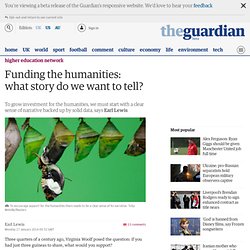
In each age we face ostensibly insurmountable challenges that require choices to be made, resources to be allocated and areas to be ignored. How is humanities research reshaping our future? Humanities research often involves an individual professor researching in a library in order to write a book.
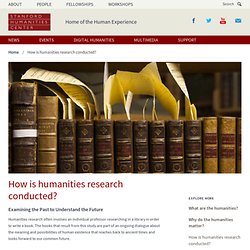
The books that result from this study are part of an ongoing dialogue about the meaning and possibilities of human existence that reaches back to ancient times and looks forward to our common future. Scholar Collaboration However, humanities research also draws from other sources and often requires alternative methods of investigation.
A research project may involve several professors from different universities sharing information in an on-line forum. A professor may collaborate with a colleague in another area of study to gain alternative perspectives on a topic. The Future of the Humanities: A Think Tank. Rezensionen: Yehuda Elkana, Hannes Klöpper: Die Universität im 21. Jahrhundert. Yehuda Elkana, Hannes Klöpper: Die Universität im 21.
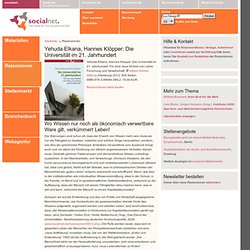
Jahrhundert. Für eine neue Einheit von Lehre, Forschung und Gesellschaft. edition Körber-Stiftung (Hamburg) 2012. 504 Seiten. ISBN 978-3-89684-088-2. 18,00 EUR. Platform-H-NU-uitgangspunten-en-doelstellingen.pdf. Academy of Europe: Bibliometrics 2013. Christina Paxson, President of Brown: Humanities Can Save Us. The Economic Case for Saving the Humanities What can we do to make the case for the humanities?
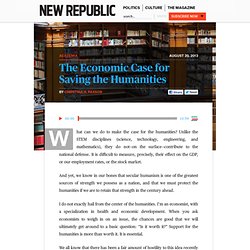
Unlike the STEM disciplines (science, technology, engineering, and mathematics), they do not—on the surface—contribute to the national defense. It is difficult to measure, precisely, their effect on the GDP, or our employment rates, or the stock market. Humanities+ Science in transition. De Vergeten Wetenschappen. As Interest Fades in the Humanities, Colleges Worry.
STANFORD, Calif. — On Stanford University’s sprawling campus, where a long palm-lined drive leads to manicured quads, humanities professors produce highly regarded scholarship on Renaissance French literature and the philosophy of language. How Academia Resembles a Drug Gang. In 2000, economist Steven Levitt and sociologist Sudhir Venkatesh published an article in the Quarterly Journal of Economics about the internal wage structure of a Chicago drug gang.
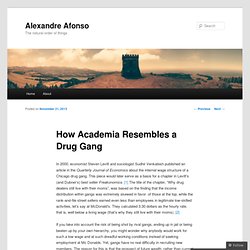
This piece would later serve as a basis for a chapter in Levitt’s (and Dubner’s) best seller Freakonomics. [1] The title of the chapter, “Why drug dealers still live with their moms”, was based on the finding that the income distribution within gangs was extremely skewed in favor of those at the top, while the rank-and-file street sellers earned even less than employees in legitimate low-skilled activities, let’s say at McDonald’s. They calculated 3.30 dollars as the hourly rate, that is, well below a living wage (that’s why they still live with their moms). [2] With a constant supply of new low-level drug sellers entering the market and ready to be exploited, drug lords can become increasingly rich without needing to distribute their wealth towards the bottom. Academia as a Dual Labour Market. Oxford survey finds humanities degrees pay. Long-term study of alumni careers questions coalition’s STEM emphasis Source: Alamy Questionable figures: results of a study cast doubt on the government’s prioritisation of funds for science subjects The University of Oxford has used a study of its humanities graduates’ careers to question the government’s financial prioritisation of science students, a policy it claims was “formulated without an evidence base”.
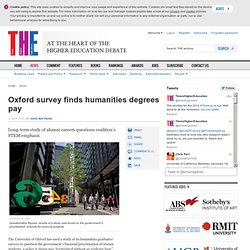
Oxford has tracked the fortunes of around 11,000 alumni who joined the university between 1960 and 1989 and concludes that they have played a growing role in emerging UK industrial sectors, particularly finance and law. Relying on salary data from graduates’ first jobs is “not a sound basis” for judging the impact of humanities degrees throughout alumni’s working lives, Humanities Graduates and the British Economy: The Hidden Impact argues.
History shows: the humanities have vocational utility (essay) The current state and future prospects of the humanities are occasioning considerable anxious comment. Many humanists are sadly resigned to a belief that the humanities have irrevocably ceded pride of place to the social sciences and sciences; and, indeed, the social sciences and sciences generate and command much intellectual energy in the 21st-century university, for understandable reasons. The usual remedies proposed for this state of affairs have seemed to me to be limited at best and perhaps even misguided. A typical argument for the utility of the humanistic disciplines is that studying them enhances critical thought and powers of expression, and one would certainly agree.
NRC_20130914_1_048_article1.jpg (JPEG-afbeelding, 1600x1062 pixels) De springlevende geesteswetenschap. Binnen mijn vakgebied, de psycholinguïstiek (specifiek, de tweedetaalverwerving), is er in de laatste jaren veel veranderd door het toenemende gebruik van neurowetenschappelijke onderzoeksmethoden. Wat ik zelf de belangrijkste ontwikkeling van de afgelopen decennia vind is het onderzoek naar grammaticalisatie, een proces van taalverandering waarbij geleidelijk nieuwe grammaticale elementen of structuren ontstaan.
Als vooraanstaande biologen jaren geleden niet hadden ingezien dat hun toekomst lag bij de moleculaire… Lees deze bijdrage.